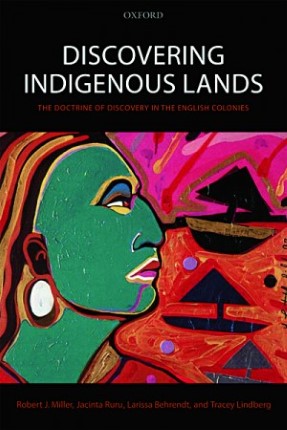Discovering Indigenous Lands: The Doctrine of Discovery in the English Colonies—Robert J. Miller, Jacinta Ruru, Larissa Behrendt and Tracey Lindberg (2010)

'Discovering Indigenous Lands' provides a fresh and unique insight into the application and interpretation of the doctrine of discovery from an indigenous legal perspective.
Publication details
Miller, R. J., J. Ruru, L. Behrendt and T. Lindberg. Discovering Indigenous Lands: The Doctrine of Discovery in the English Colonies. London, UK: Oxford University Press, 2010.
About the book
When Europeans set out to exploit and expropriate the lands, commercial, governmental, and human rights of the indigenous peoples of Australia, Canada, New Zealand, and the United States in the 15th through to the 20th centuries, they justified their sovereignty and claims over these territories and over indigenous peoples with the Discovery Doctrine. This legal principle was justified by religious and ethnocentric ideas of European and Christian superiority over the other cultures, religions, and races of the world.
Viewing Australian, Canadian, New Zealand, and American history and law in light of the international law Doctrine of Discovery, this book explores all four countries providing a deeper and more contextual understanding of the use of the doctrine and what colonial law has done to indigenous lands.
Co-authored by four leading indigenous legal academics including Professor Jacinta Ruru (Raukawa, Ngāti Ranginui and Ngāti Maniapoto), Discovering Indigenous Lands shines new light on the mostly ignored historical and legal evidence of the use of the Doctrine of Discovery
Further information
This publication is part of the series Te Takarangi: Celebrating Māori publications - a sample list of 150 non-fiction books produced by a partnership between Royal Society Te Apārangi and Ngā Pae o te Māramatanga.
